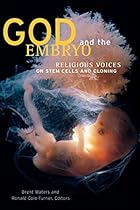God and the Embryo: Religious Voices on Stem Cells and Cloning

| Author | : | |
| Rating | : | 4.13 (586 Votes) |
| Asin | : | 087840998X |
| Format Type | : | paperback |
| Number of Pages | : | 240 Pages |
| Publish Date | : | 2015-10-16 |
| Language | : | English |
DESCRIPTION:
Parker Sharp Professor of Theology and Ethics at Pittsburgh Theological Seminary and an ordained minister in the United Church of Christ. Ronald Cole-Turner is the H. He is the author of Reproductive Technology: Towards a Theology of Procreative Stewardship and co-author (with Ronald Cole-Turner) of Pastoral Genetics: Theology and Care at the Beginning of Life. Recent publications include the edited volumes, Huma
Conall D. Ocuinn said Medley of perspectives. This book had its genesis in a "Medley of perspectives" according to Conall D. Ocuinn. This book had its genesis in a 2001 seminar called "The Ethics of Human Embryonic Stem Cell Research, " but includes follow-up essays dealing with later developments. It tries to catch a fast moving ball on the hop. The pivotal point in this book is the moral status of the embryo up to 1Medley of perspectives Conall D. Ocuinn This book had its genesis in a 2001 seminar called "The Ethics of Human Embryonic Stem Cell Research, " but includes follow-up essays dealing with later developments. It tries to catch a fast moving ball on the hop. The pivotal point in this book is the moral status of the embryo up to 14 days by which time the individuality of the embryo has become clear beyond all doubt. Up to that point identical twins or triplets can spring from one embryo, and two embryos can merge to develop into one. Differ. days by which time the individuality of the embryo has become clear beyond all doubt. Up to that point identical twins or triplets can spring from one embryo, and two embryos can merge to develop into one. Differ. 001 seminar called "The Ethics of Human Embryonic Stem Cell Research, " but includes follow-up essays dealing with later developments. It tries to catch a fast moving ball on the hop. The pivotal point in this book is the moral status of the embryo up to 1Medley of perspectives Conall D. Ocuinn This book had its genesis in a 2001 seminar called "The Ethics of Human Embryonic Stem Cell Research, " but includes follow-up essays dealing with later developments. It tries to catch a fast moving ball on the hop. The pivotal point in this book is the moral status of the embryo up to 14 days by which time the individuality of the embryo has become clear beyond all doubt. Up to that point identical twins or triplets can spring from one embryo, and two embryos can merge to develop into one. Differ. days by which time the individuality of the embryo has become clear beyond all doubt. Up to that point identical twins or triplets can spring from one embryo, and two embryos can merge to develop into one. Differ. "Ethics In the Face of Uncertainties" according to rodboomboom. This book is a well done collection of essays on the controversial subject of stem cells and cloning from various religious perspectives.While all were fascinating to read, several caught my attention.Especially Fitzgerald's, the main subject of his essay being the title chosen for this review. He makes the salient point that there are pervading issues of uncertainty on this controversial issue of stem cell research, especially in the two areas that some would make it seem it's a slam dunk: scient. "Very complete" according to D. Barker. The book is a series of articles from religious scholars about the subjects of cloning and stem cell research. It is not a book about attacking these subjects, which was a treat for me. Some of the scholars are long winded, and I avoided those articles. If you are doing a research paper on this subject this is a perfect book to have to learn the various religious points of view of the major faiths.
In addition to the discussions found here, God and the Embryo includes a series of official statements on stem cell research and cloning from religious bodies, including the Roman Catholic Church, the Orthodox Church in America, the United Methodist Church, the Southern Baptist Convention, the United Church of Christ, the Presbyterian Church (USA), and the Union of Orthodox Jewish Congregations of America and the Rabbinical Council of America. "Human Cloning and Human Dignity: An Ethical Inquiry," from the statement of the President's Council on Bioethics, concludes the book.The debates and the discussions will continue, but for anyone interested in the nuances of religious perspectives that make their important contributions to these ethically challenging and important dialectics, God and the Embryo is an invaluable resource.. This anthology on how religious perspectives can inform the difficult issues of stem cell resear
It especially merits inclusion in any library concerned with the interface of stem cell research, medical ethics, and religious traditions."Commonweal. Such volumes often seem spotty and only loosely integrated. But God and the Embryo is an exception. "Few readers are drawn to pick up a book of collected essays
